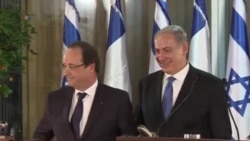French President Francois Hollande says his government will maintain sanctions and pressure against Iran until he is certain that it has renounced a suspected nuclear weapons program.
Hollande made the pledge to Israeli leaders after arriving in Israel Sunday at the start of a three-day visit. In a welcome ceremony at the airport, the French president said Paris will not tolerate nuclear proliferation. Speaking in Hebrew, Hollande also said, "I will always remain a friend of Israel."
Israel has been urging France and five other world powers not to ease sanctions on Iran as they negotiate with the government of Iranian President Hassan Rouhani, who took office in August. Israeli leaders see a nuclear armed Iran as a threat to their nation's existence. Tehran has repeatedly called for Israel's demise.
The six world powers, known as the P5+1, held a second round of talks with the Rouhani government in Geneva earlier this month, hoping to reach a diplomatic solution to international concerns about possible military dimensions to Iran's nuclear program. Another round is due to begin in Geneva Wednesday.
Iran has demanded relief from sanctions that have hurt its economy, but has refused to stop uranium enrichment, a process with civilian and military uses.
Israeli Prime Minister Benjamin Netanyahu has repeatedly warned against easing pressure on Iran without forcing it to give up uranium enrichment. Speaking Sunday at a joint news conference with Hollande, the Israeli prime minister said such a concession would be a "dream deal" for Iran and the "worst nightmare" for the world.
In a report published Sunday, the Iranian news agency ISNA quoted Foreign Minister Mohammad Javad Zarif as saying Iran does need other countries to explicitly "recognize" an Iranian right to enrich uranium. Zarif said enrichment already is a fundamental right that "all countries should respect."
France has said it opposes any deal that would do too little to curb Iran's enrichment or to stop its development of a reactor capable of producing plutonium, another nuclear weapons ingredient.
Western powers accuse Iran of trying to develop nuclear weapons under the guise of civilian energy and medical research, a charge Tehran denies.
Hollande made the pledge to Israeli leaders after arriving in Israel Sunday at the start of a three-day visit. In a welcome ceremony at the airport, the French president said Paris will not tolerate nuclear proliferation. Speaking in Hebrew, Hollande also said, "I will always remain a friend of Israel."
Israel has been urging France and five other world powers not to ease sanctions on Iran as they negotiate with the government of Iranian President Hassan Rouhani, who took office in August. Israeli leaders see a nuclear armed Iran as a threat to their nation's existence. Tehran has repeatedly called for Israel's demise.
The six world powers, known as the P5+1, held a second round of talks with the Rouhani government in Geneva earlier this month, hoping to reach a diplomatic solution to international concerns about possible military dimensions to Iran's nuclear program. Another round is due to begin in Geneva Wednesday.
Iran has demanded relief from sanctions that have hurt its economy, but has refused to stop uranium enrichment, a process with civilian and military uses.
Israeli Prime Minister Benjamin Netanyahu has repeatedly warned against easing pressure on Iran without forcing it to give up uranium enrichment. Speaking Sunday at a joint news conference with Hollande, the Israeli prime minister said such a concession would be a "dream deal" for Iran and the "worst nightmare" for the world.
In a report published Sunday, the Iranian news agency ISNA quoted Foreign Minister Mohammad Javad Zarif as saying Iran does need other countries to explicitly "recognize" an Iranian right to enrich uranium. Zarif said enrichment already is a fundamental right that "all countries should respect."
France has said it opposes any deal that would do too little to curb Iran's enrichment or to stop its development of a reactor capable of producing plutonium, another nuclear weapons ingredient.
Western powers accuse Iran of trying to develop nuclear weapons under the guise of civilian energy and medical research, a charge Tehran denies.






